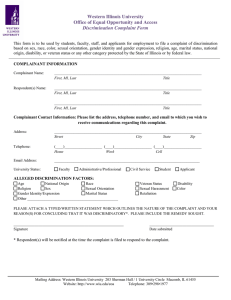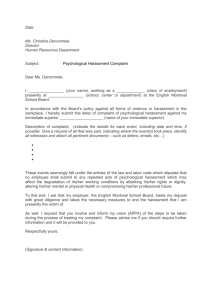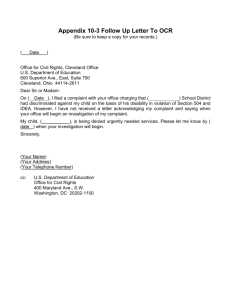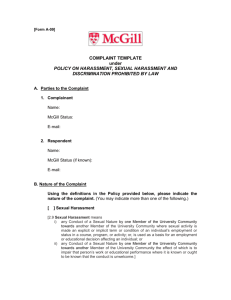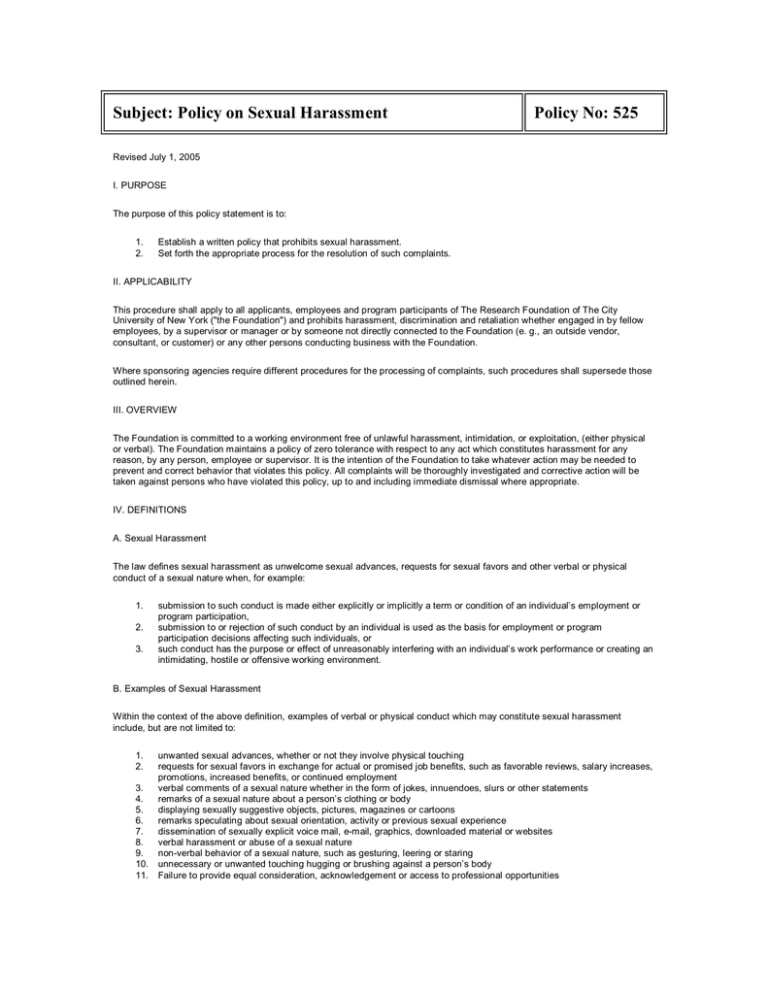
Subject: Policy on Sexual Harassment Policy No: 525 Revised July 1, 2005 I. PURPOSE The purpose of this policy statement is to: 1. 2. Establish a written policy that prohibits sexual harassment. Set forth the appropriate process for the resolution of such complaints. II. APPLICABILITY This procedure shall apply to all applicants, employees and program participants of The Research Foundation of The City University of New York ("the Foundation") and prohibits harassment, discrimination and retaliation whether engaged in by fellow employees, by a supervisor or manager or by someone not directly connected to the Foundation (e. g., an outside vendor, consultant, or customer) or any other persons conducting business with the Foundation. Where sponsoring agencies require different procedures for the processing of complaints, such procedures shall supersede those outlined herein. III. OVERVIEW The Foundation is committed to a working environment free of unlawful harassment, intimidation, or exploitation, (either physical or verbal). The Foundation maintains a policy of zero tolerance with respect to any act which constitutes harassment for any reason, by any person, employee or supervisor. It is the intention of the Foundation to take whatever action may be needed to prevent and correct behavior that violates this policy. All complaints will be thoroughly investigated and corrective action will be taken against persons who have violated this policy, up to and including immediate dismissal where appropriate. IV. DEFINITIONS A. Sexual Harassment The law defines sexual harassment as unwelcome sexual advances, requests for sexual favors and other verbal or physical conduct of a sexual nature when, for example: 1. 2. 3. submission to such conduct is made either explicitly or implicitly a term or condition of an individual’s employment or program participation, submission to or rejection of such conduct by an individual is used as the basis for employment or program participation decisions affecting such individuals, or such conduct has the purpose or effect of unreasonably interfering with an individual’s work performance or creating an intimidating, hostile or offensive working environment. B. Examples of Sexual Harassment Within the context of the above definition, examples of verbal or physical conduct which may constitute sexual harassment include, but are not limited to: 1. 2. unwanted sexual advances, whether or not they involve physical touching requests for sexual favors in exchange for actual or promised job benefits, such as favorable reviews, salary increases, promotions, increased benefits, or continued employment 3. verbal comments of a sexual nature whether in the form of jokes, innuendoes, slurs or other statements 4. remarks of a sexual nature about a person’s clothing or body 5. displaying sexually suggestive objects, pictures, magazines or cartoons 6. remarks speculating about sexual orientation, activity or previous sexual experience 7. dissemination of sexually explicit voice mail, e­mail, graphics, downloaded material or websites 8. verbal harassment or abuse of a sexual nature 9. non­verbal behavior of a sexual nature, such as gesturing, leering or staring 10. unnecessary or unwanted touching hugging or brushing against a person’s body 11. Failure to provide equal consideration, acknowledgement or access to professional opportunities
V. SUPERVISORY RESPONSIBILITY A supervisor, manager and/or project director or principal investigator who has knowledge of or becomes aware of an incident of sexual harassment must take reasonable steps to correct the problem and is obligated to report the incident, as well as a description of the steps taken to resolve the incident, to the Department of Employment Policy and Practice. Failure to address and/or to report the situation may result in disciplinary action of the supervisor up to and including termination. VI. COMPLAINT PROCEDURE A project employee ("field employee") of The Research Foundation who has a complaint against an employee of the University may take the complaint to the University's Sexual Harassment Coordinator, Deputy Coordinator or any member of the College’s Sexual Harassment Awareness and Intake Committee but must also report the complaint to the Office of Employment Policy and Practice. It is the intent of both the RF and the University to work cooperatively to resolve the incident. An employee may elect to pursue their complaint informally or formally. i. Informal Complaint Resolution Should the employee wish to pursue the complaint informally, the employee may ask his or her manager, project director, principal investigator or a member of the Employment Policy and Practice Department to help mediate an acceptable settlement of the complaint. A written report of the incident and the remedial action taken must be filed with the Director of Employment Policy and Practice. Remedial steps, consistent with the level of harmful conduct, up to and including immediate dismissal, will be taken to correct and/or prevent any future harassment. Confidentiality will be respected to the maximum extent possible. If the complainant is satisfied with the proposed resolution, the incident will be considered closed. If the complainant is not satisfied, s/he should file a formal complaint. ii. Formal Complaint Procedures 1. 2. 3. 4. 5. 6. If the complaint cannot be resolved informally, the employee must present the complaint, preferably in writing in brief narrative form, to the Research Foundation’s Director of Employment Policy and Practice. This should take place as promptly as possible after the action on which the complaint is based. The complaint should include a description of the incident, the names of possible witnesses and the nature and description of possible evidence. The complaint will be shared with the respondent who will be allowed to view the complaint, if it is in writing, or will have the complaint fully explained to them by the person conducting the investigation. Once the Director of Employment Policy and Practice is made aware of the complaint, the Director or his or her designee will conduct a thorough investigation of the allegations made. In the event the complaint also involves an employee of the City University of New York, the Foundation’s Director of Employment Policy and Practice shall forward a copy of the complaint to the designated representative of the University and will work with the University’s staff to resolve the complaint. The complaint will be kept confidential to the maximum extent possible. The investigation will be concluded within 60 business days of the written complaint except when circumstances warrant an extension of the investigation period. Should the President of the Research Foundation deem it necessary, s/he can take whatever action is appropriate to protect the Foundation and its employees. Upon completion of the investigation, the Director of Employment Policy and Practice shall issue a written decision regarding the complaint. The complainant and the respondent will receive a copy of the decision. If the investigation determines that the claim has merit, remedial steps, consistent with the level of harmful conduct, up to and including immediate dismissal, will be taken to address the conduct and/or prevent its future occurrence. Copies of the decision shall be forwarded to the President of the Research Foundation. Within 10 working days of the receipt of the decision, the complainant, the respondent, the Principal Investigator or the Project Director may request a review of the decision by the Foundation’s President. The request for review must be in writing. The President shall determine whether there is a basis for review and shall also determine the necessity of meeting with all concerned parties either jointly or separately to resolve the issue or issues. Thereafter, the President shall issue a decision within 45 business days of receiving the request for review. In cases where a CUNY employee was the complainant or the respondent, the President will consult with his or her appropriate counterpart at the College (or other location) before issuing a decision. VII. RECORD KEEPING Records regarding complaints of sexual harassment shall be maintained in a secure location separate from other personnel records. VIII. RETALIATION
Retaliation against an individual who makes a bona fide complaint of sexual harassment, cooperates in the investigation of the complaint, or provides information relevant to such complaint is strictly prohibited and will be treated as a serious violation of this policy. Knowingly filing a false complaint under this policy is also strictly prohibited. The failure to substantiate a harassment complaint, however, is not in and of itself sufficient to demonstrate that a complaint was false. IX. IMPLEMENTATION This policy is effective immediately.


